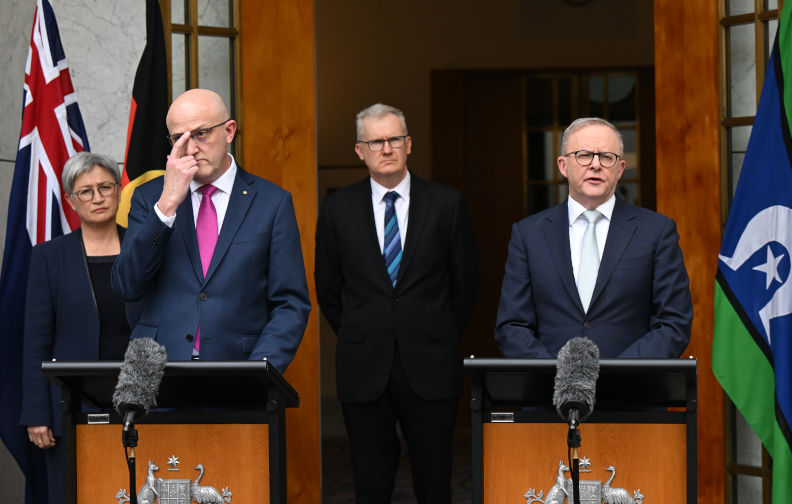Terrorists are them, never us
August 31, 2025
Almost as quickly as Anthony Albanese signed up for AUKUS, he has now agreed to join the United States in making Iran’s Revolutionary Guard Corps (IRGC) the 32nd terrorist organisation designated by Australia.
The timing, once again, is exquisite. The prime minister, usually cautious to a fault, and after rejecting US advice to list the IRGC for two years, now seems to have rushed to judgment about it. Even the leaders of Australian pro-Israel organisations stood up for him after Prime Minister Netanyahu attacked him for being “weak” in the face of widespread pro-Palestinian and anti-Israeli protests in Australia, and for announcing that, in September, Australia will join more than 147 other member states in recognising Palestine as a full member of the United Nations. So why list the IRGC now?
If ASIO’s intelligence is right, the IRGC remotely directed “at least” two of the attacks, on a Sydney Jewish-Australian restaurant in October and a Melbourne synagogue in December last year. That has probably been known for months, together with the identities of the inept criminals hired for the job. We still wait to know who was behind the bomb-loaded caravan in Dural which NSW Premier Chris Minns at once called a terrorist plot. Little has been revealed, either, about the swastika-graffitists in Sydney’s eastern suburbs who daubed antisemitic slogans on walls early this year.
Hired criminals, whatever their political persuasion, are not necessarily terrorists. There are enough crimes on the books to put them away and relieve them of the few thousand dollars they were paid, without invoking the many pieces of anti-terrorist legislation passed in Australia since 2001. But that’s when Australia, thanks to John Howard and Alexander Downer, joined the “war on terror”, which continues to this day, inspiring more terrorists. Their techniques now involve cyber and drone attacks, online recruiting, and AI. “Terrorists” now even include former enemies of the US, and of Australia.
Anti-terror investigations are intended — as ordinary criminal inquiries are not — to identify motive, preparation or advocacy in anticipation of an ideological or political attack, and to prevent it happening. An individual or organisation that does any of those things can be accused of being a terrorist under division 102 of Australia’s Criminal Code Act. So can anyone who directs the activities of a terrorist organisation, is a member of one, or is merely associated with one ( Keiran Hardy, The Conversation, 26 August 2025). And so, of course, can anyone who is found after the event to have committed an act of terrorism, whether ideologically or politically motivated – an egregious example being the Christchurch terrorist, Australian Brenton Tarrant.
What we don’t yet have is a list of identified terrorists, their acts, or their motivation for recent antisemitic events, none of them fatal. It’s a crime even to inquire about a special intelligence operation that might be investigating it, or to report about one. We don’t know, and are unlikely to know, who supplied the intelligence to ASIO about the IRGC, when, or why. As Australian Middle Eastern authority Professor Amin Saikal says, the government should now “make public the hard evidence for its actions” ( Amin Saikal, Iran confrontation comes at a cost, SMH 28 August 2025). That should come from the Five Eyes, or from Israel, the most likely sources.
What we do have is an information vacuum. Into that flows the propaganda that we have all been fed for years from the US, the UK, Israel and others. Australians have absorbed from US sources ever since 1979 that Iran is led by Islamic tyrants. If so, the self-promoted shahs were no less tyrannical, but they were friends then of Israel, South Africa and the US. They ran the same local intelligence operations, and the same prisons as today’s ayatollahs.
At the last two elections, Australians showed they didn’t necessarily allow Iran to influence their votes. But by going to elections with no foreign or defence policy choices offered by either major party, they voted in pious hope of something better. Governments’ failure to deliver is what brought them out in thousands for Palestine and forced Albanese’s hand.
Australians have been offered no explanation now about what Iran has to gain from attacking Jewish Australians or their premises by remote control. Instead, Netanyahu revels in the credit for Australia’s unprecedented expulsion of the Iranian ambassador, sudden and unnecessary as it is.
Australia’s decision to declare the IRGC a terrorist organisation makes it a target for attack, as it is for the US, UK, and Israel. That implicates us in taking their side when the situation deteriorates, as our allies intend it will. The only question is when. If Australia is drawn into war with Iran, that will be bad enough. We should compare the process with the slow march to war with China, which will be much more devastating for us.
The views expressed in this article may or may not reflect those of Pearls and Irritations.


